Unit 2 Travelling(共95张PPT)
文档属性
| 名称 | Unit 2 Travelling(共95张PPT) |  | |
| 格式 | pptx | ||
| 文件大小 | 1.6MB | ||
| 资源类型 | 教案 | ||
| 版本资源 | 牛津译林版 | ||
| 科目 | 英语 | ||
| 更新时间 | 2024-05-16 16:51:20 | ||
图片预览

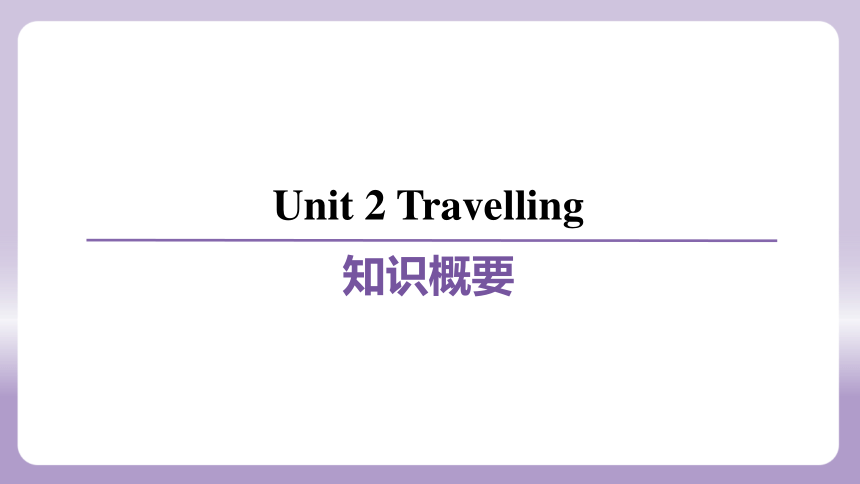
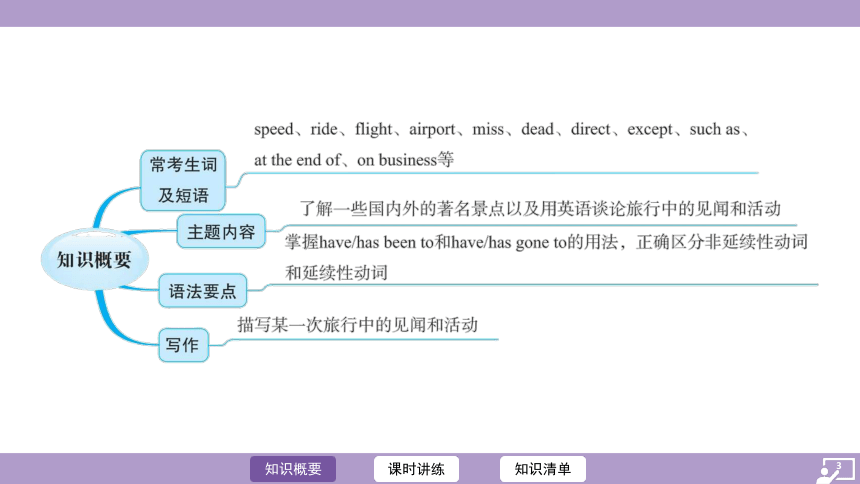
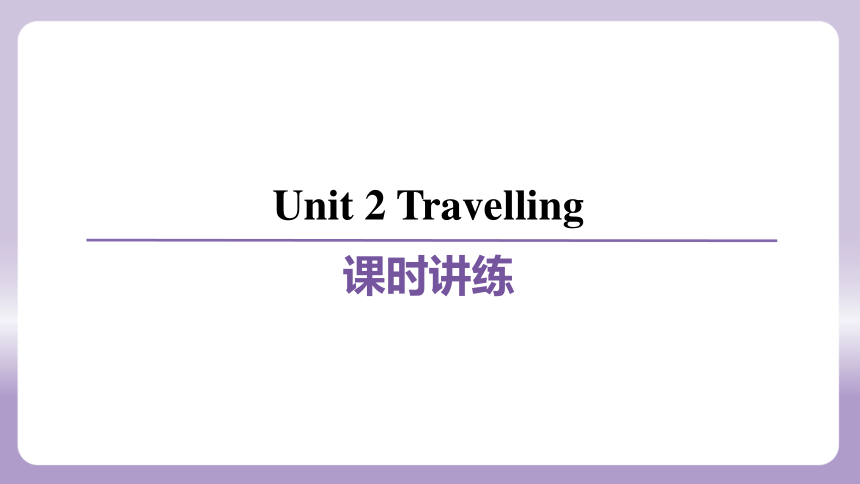
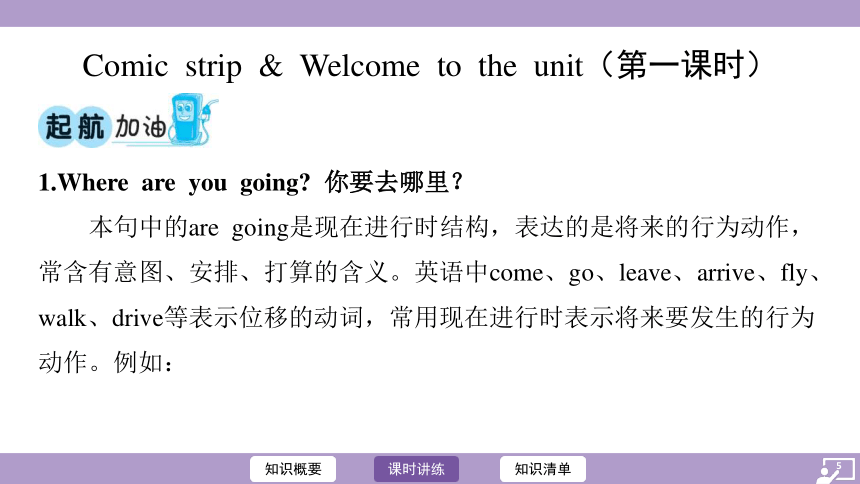
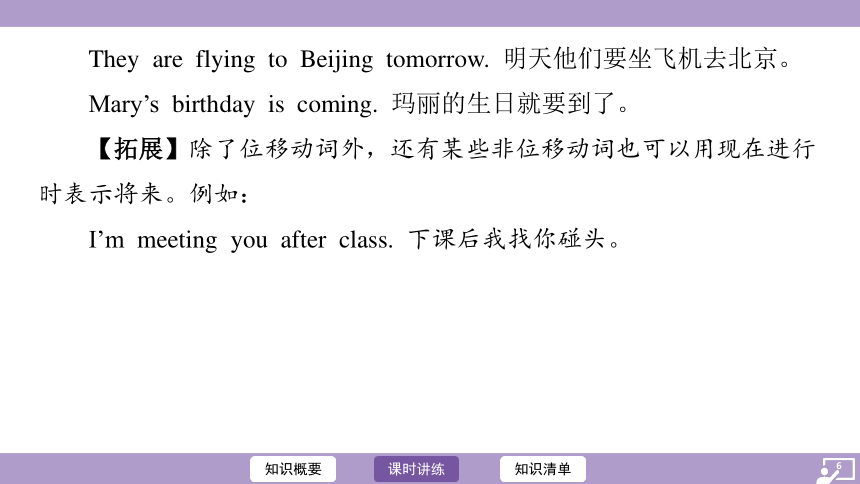
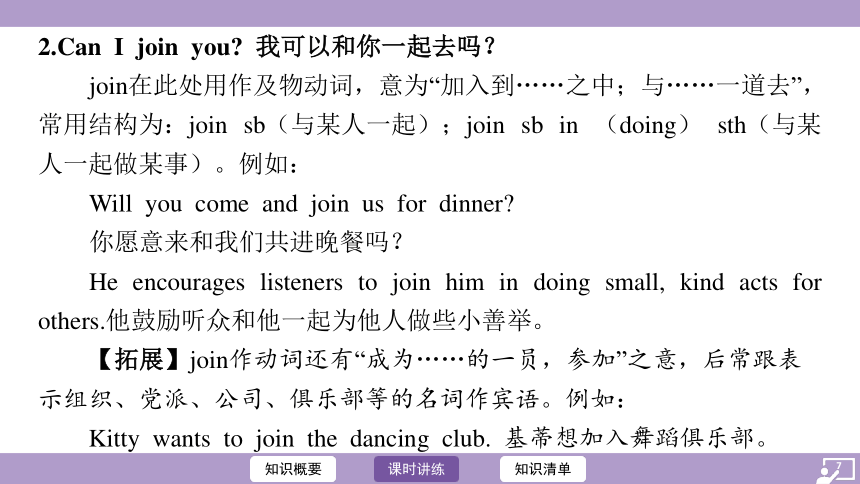
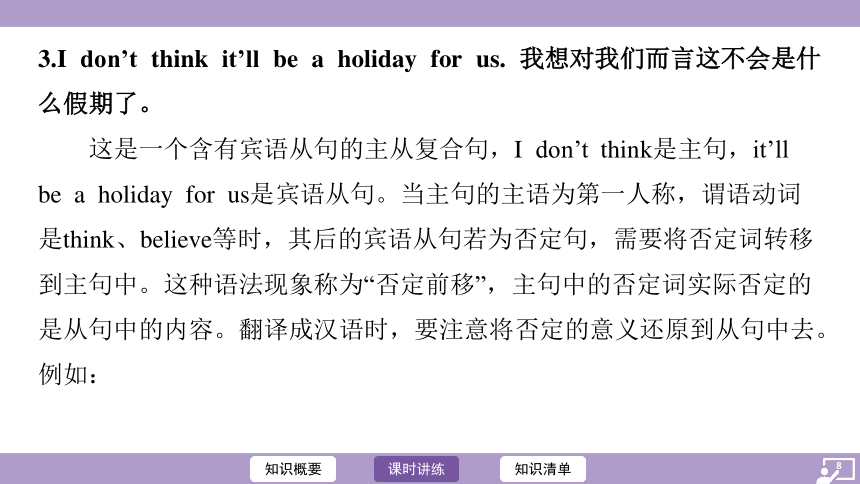
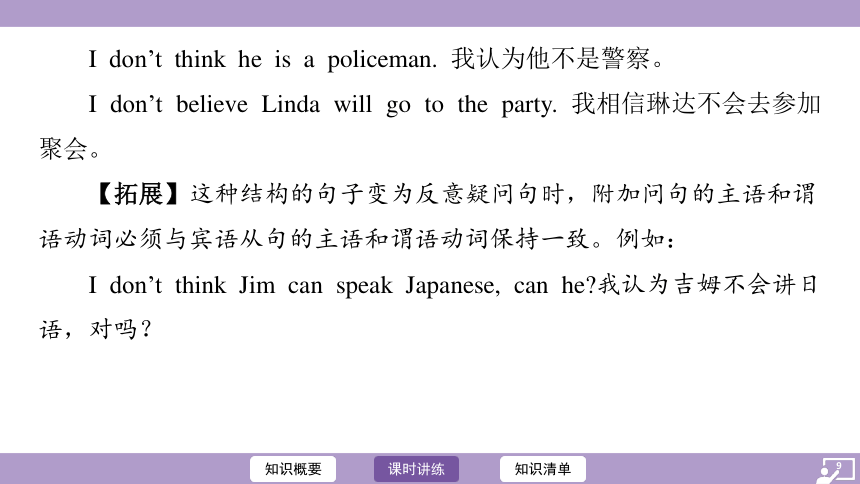
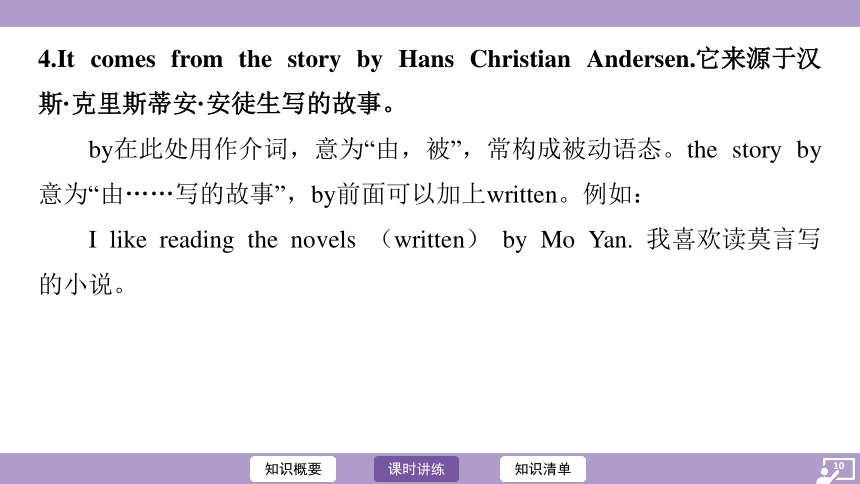
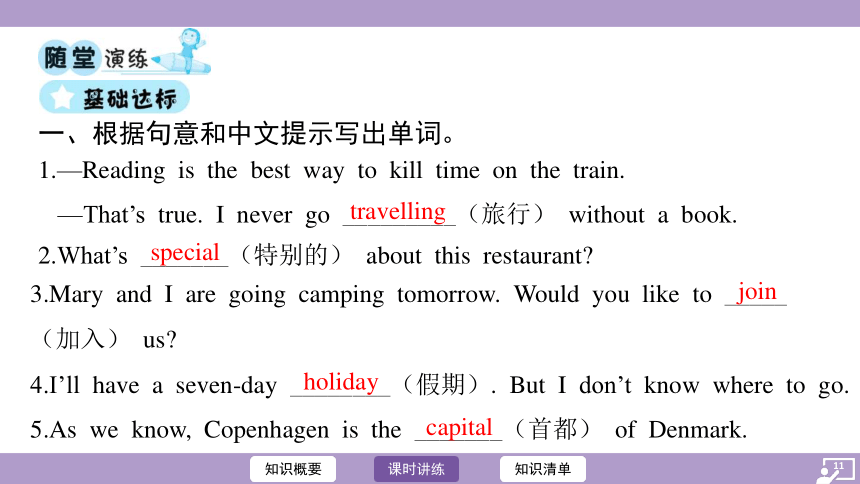
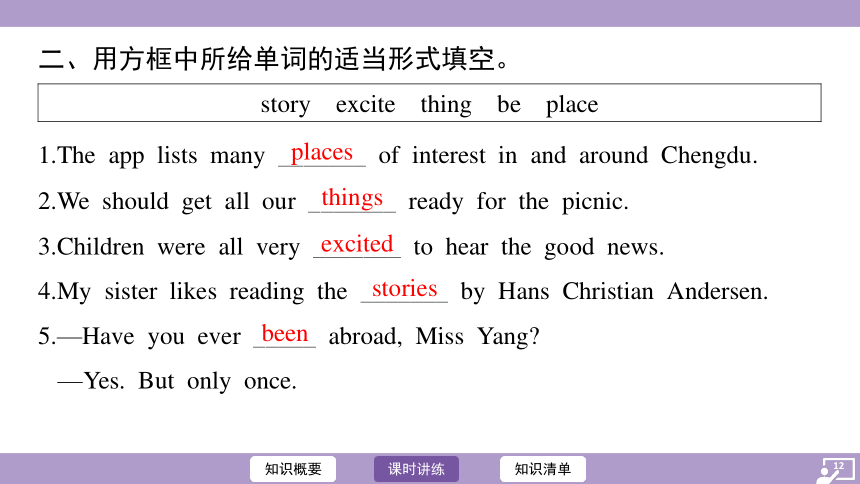
文档简介
(共95张PPT)
Unit 2 Travelling
Unit 2 Travelling
知识概要
Unit 2 Travelling
课时讲练
Comic strip & Welcome to the unit(第一课时)
1.Where are you going 你要去哪里?
本句中的are going是现在进行时结构,表达的是将来的行为动作,常含有意图、安排、打算的含义。英语中come、go、leave、arrive、fly、walk、drive等表示位移的动词,常用现在进行时表示将来要发生的行为动作。例如:
They are flying to Beijing tomorrow. 明天他们要坐飞机去北京。
Mary’s birthday is coming. 玛丽的生日就要到了。
【拓展】除了位移动词外,还有某些非位移动词也可以用现在进行时表示将来。例如:
I’m meeting you after class. 下课后我找你碰头。
2.Can I join you 我可以和你一起去吗?
join在此处用作及物动词,意为“加入到……之中;与……一道去”,常用结构为:join sb(与某人一起);join sb in (doing) sth(与某人一起做某事)。例如:
Will you come and join us for dinner
你愿意来和我们共进晚餐吗?
He encourages listeners to join him in doing small, kind acts for others.他鼓励听众和他一起为他人做些小善举。
【拓展】join作动词还有“成为……的一员,参加”之意,后常跟表示组织、党派、公司、俱乐部等的名词作宾语。例如:
Kitty wants to join the dancing club. 基蒂想加入舞蹈俱乐部。
3.I don’t think it’ll be a holiday for us. 我想对我们而言这不会是什么假期了。
这是一个含有宾语从句的主从复合句,I don’t think是主句,it’ll be a holiday for us是宾语从句。当主句的主语为第一人称,谓语动词是think、believe等时,其后的宾语从句若为否定句,需要将否定词转移到主句中。这种语法现象称为“否定前移”,主句中的否定词实际否定的是从句中的内容。翻译成汉语时,要注意将否定的意义还原到从句中去。例如:
I don’t think he is a policeman. 我认为他不是警察。
I don’t believe Linda will go to the party. 我相信琳达不会去参加聚会。
【拓展】这种结构的句子变为反意疑问句时,附加问句的主语和谓语动词必须与宾语从句的主语和谓语动词保持一致。例如:
I don’t think Jim can speak Japanese, can he 我认为吉姆不会讲日语,对吗?
4.It comes from the story by Hans Christian Andersen.它来源于汉斯·克里斯蒂安·安徒生写的故事。
by在此处用作介词,意为“由,被”,常构成被动语态。the story by意为“由……写的故事”,by前面可以加上written。例如:
I like reading the novels (written) by Mo Yan. 我喜欢读莫言写的小说。
一、根据句意和中文提示写出单词。
1.—Reading is the best way to kill time on the train.
—That’s true. I never go _________(旅行) without a book.
travelling
2.What’s _______(特别的) about this restaurant
special
3.Mary and I are going camping tomorrow. Would you like to _____
(加入) us
4.I’ll have a seven-day ________(假期). But I don’t know where to go.
5.As we know, Copenhagen is the _______(首都) of Denmark.
join
holiday
capital
二、用方框中所给单词的适当形式填空。
story excite thing be place
1.The app lists many _______ of interest in and around Chengdu.
2.We should get all our _______ ready for the picnic.
3.Children were all very _______ to hear the good news.
4.My sister likes reading the _______ by Hans Christian Andersen.
places
things
excited
stories
5.—Have you ever _____ abroad, Miss Yang
—Yes. But only once.
been
三、单项选择。
( ) 1.Which of the following is not a capital city
C
A.Copenhagen. B.Beijing. C.Sydney.
( ) 2.—Have you been to Nanjing ________
—No, never. But my father will take me there next month.
B
A.ago B.before C.already
( ) 3.The Greens are going to Yunnan ________ their holiday.
A
A.for B.to C.from
( ) 4.I don’t think Emma can go shopping by herself, ________
A
A.can she B.don’t you C.can’t she
( ) 5.—I’d like you to tell me something about Shennongjia.
—OK. I ________ there with my family twice.
A
A.have been B.have gone C.went to
Reading(第二、三课时)
1.Today we spent the whole day at Disneyland. 今天我们在迪士尼乐园待了一整天。
whole是形容词,意为“全部的;整个的”,一般只修饰具有整体意义的可数名词单数,且要放在限定词(定冠词the、形容词性物主代词)后面。例如:
The whole trip takes you about three hours. 整个旅行花费你大约三个小时。
【拓展】表示“全部的”也可以用all,它可以修饰可数名词或不可数名词,且要放在限定词(定冠词the、形容词性物主代词)之前。例如:
All the students in our class study hard.我们班所有的学生都努力学习。
2.It moved at high speed and was really exciting! 它高速转动,的确很令人兴奋!
speed作名词用时意为“速度”,常用短语:at high/low/full/top speed(以高/低/全/最高速),at a/the speed of(以……的速度)。例如:
The train is running at high speed. 那列火车在高速行驶。
The car is moving at a/the speed of 120 kilometres an hour. 汽车正在以每小时120千米的速度行驶。
3.Next, we hurried to a restaurant to have a quick meal. 接着,我们匆忙来到一家餐馆,匆匆吃了一顿饭。
hurry在此处是不及物动词,意为“匆忙,赶忙”。常见搭配为:“hurry to+地点名词”(匆忙去某地),hurry to do sth(匆忙做某事),hurry up(赶快)。例如:
If we hurry, we’ll get there in time. 要是赶快的话,我们会及时到那里。
The kids hurried to open their presents.孩子们迫不及待地打开他们的礼物。
Hurry up, or you’ll miss the last bus. 快点儿,否则你们要错过最后一班公共汽车了。
【拓展】hurry也可作名词,意为“急忙,匆忙”。in a hurry是常见固定搭配,意为“匆忙地”。例如:
She had to leave in a hurry. 她不得不赶快离开。
4.On the way, we met some Disney cartoon characters, such as Snow White and Mickey Mouse. 在路上,我们遇见了一些迪士尼卡通人物,例如白雪公主和米老鼠。
【辨析】such as与for example
such as 用来列举同类人或物中的几个例子,常置于被列举的事物
之前,其前一般用逗号隔开,其后直接跟列举的名词或动
名词等
for example 用来列举同类人或物中的一个例子,在句中作插入语,前
后用逗号隔开,可置于句首、句中或句末
例如:
He has been to many different countries, such as Egypt, England, Australia, Italy and Thailand. 他去过很多不同的国家,比如埃及、英格兰、澳大利亚、意大利和泰国。
Noise, for example, is a kind of pollution. 比如说噪声是一种污染。
5.I ran after them and couldn’t stop taking photos. 我跟着他们跑,忍不住一直拍照。
can’t stop doing sth意为“忍不住一直做某事”。例如:
Hearing the news, she couldn’t help jumping for joy. 听到这个消息,她忍不住高兴得跳了起来。
6.I bought a couple of key rings for classmates. 我给同学们买了几个钥匙环。
couple作名词,意为“两人,两件事物;几个人,几件事物”,也可表示“夫妻;情侣”。a couple of意为“几个;一对”,后接可数名词复数。例如:
A couple of boys are playing chess. 两个男孩在下象棋。
The couple got married in 2015. 那对夫妇于2015年结婚。
一、根据句意和中文提示写出单词。
1.Most children like ________(卡通) characters very much.
2.You’ll have to ______(赶快) if you want to catch that train.
3.Do you believe in _______(魔法)
4.I could _____(感觉到) the energy in his words.
5.Mrs Zhang no longer teaches us. How we _____(想念) her!
cartoon
hurry
magic
feel
miss
6.We spent the _______(整个的) day visiting Hongshan Forest Zoo
yesterday.
7.The plane can reach a______(速度) of 900 kilometres an hour.
8.I think it will be a________(美妙的) weekend.
9.When we came out of the cinema, we saw a _______(几个) of
taxis waiting along the street.
10.We have to do some _______(户内的) activities because of the
heavy rain.
whole
speed
fantastic
couple
indoor
二、用括号内所给词的正确形式填空。
1.Just now I ate two apple_____(pie), so I’m not hungry now.
2.Jack is not in right now. Would you please call him _____(late)
3.At the party, everyone had fun ________(dance) to the rock music.
4.We need a ________(sleep) bag for the coming camping trip.
pies
later
dancing
sleeping
5.Every Friday, he goes to the theatre _________(enjoy) Beijing opera.
6.I have many hobbies, such as __________(collect) coins, playing
basketball and fishing.
7.Hearing what Alice said, her father couldn’t stop _________(laugh).
8.The waiter hurried ________(clean) up the pieces of the broken plates.
to enjoy
collecting
laughing
to clean
三、单项选择。
( ) 1.The horse ran through the forest ________ high speed.
C
A.on B.with C.at
( ) 2.—These lilies(百合花) ________ so good! Where did you
get them, Mum
—I bought them from a flower shop on the way home.
B
A.feel B.smell C.sound
( ) 3.—________ is your company from your home, Emma
—Just ten minutes’ ride.
B
A.How long B.How far C.How soon
( ) 4.—How long have you ________ Kyoto, Suzy
—Since I left school in 2020. I love the quiet life here.
C
A.gone to B.been to C.been in
( ) 5.—Where is Mr Lin
—He ________ to Macao on business. You can find him here
next week.
A
A.has gone B.was going C.has been
( ) 6.—Mary, how about going to Star Ocean Park together
—________!
A
A.Sounds great B.Good luck C.Enjoy yourself
四、根据汉语意思完成英语句子。每空一词。
1.课间不要互相追赶!那太危险了。
Don’t ____ _____ _____ ______ during the break! That’s too dangerous.
run
after
each
other
2.昨天晚上,汤姆乘坐地铁到达市中心。
Yesterday evening, Tom _______ at the centre of the city ____
____________.
arrived
by
underground
3.我们正要去香港旅行。
We are going on ___ _____ ___ Hong Kong.
a
trip
to
4.花园的尽头有一条小溪。
There was a stream ___ ____ _____ ___ the garden.
at
the
end
of
5.一天中最好的部分就是和家人一起吃饭。
_____ _____ _____ of the day is having dinner with our family.
The
best
part
五、根据语篇内容,从方框中选择恰当的单词,并用其正确形式填
空。每个单词只能用一次。
learn body excited for tradition many in another thing dolphin
Dear Dongdong,
I have been 1. . Hong Kong for a whole week and I will stay
here for 2. . week.
in
another
Hong Kong is really a great place to visit. There’s so 3. . to
see and do there. And I have done so many wonderful 4. ..
much
things
I’ve taken the cable car (缆车) to the Peak Galleria (山顶广场). I’ve been to Hong Kong Racing Museum. I have 5. . a lot about horse racing there. I’ve also visited Ladies’ Street. In the street, I bought some beautiful clothes 6. . my mother. Last night, I went to a Chinese concert. Chinese 7. . music has always been my favourite. This morning I went to Ocean Park and watched the dolphin show there.
learnt/learned
for
traditional
learn body excited for tradition many in another thing dolphin
8. . are so clever. They can jump from the water to touch a ball,sway (摇摆) their 9. . to the music, kiss people and even do maths. Mr Host is going to take me to an Italian film festival in Hong Kong Cultural Centre tomorrow. I’m so 10. . because I have never seen an Italian film before.
That’s all. Hope to hear from you soon.
Dolphins
bodies
excited
learn body excited for tradition many in another thing dolphin
六、完形填空。
I’m enjoying my stay in Canada. It is my first experience of being abroad, and I am trying to learn as . .1. . as possible.
Classes here are much more fun and very different from classes in China. In China there are very few chances to practise . .2. . and listening, so many Chinese students have good grammar, . .3. . they are poor at spoken English.
Studying English at Fern is much more practical. We actually . .4. . the language we are learning. I couldn’t speak any English at all when I arrived here. Thankfully after about a month, things started getting . .5. . and I made friends and started to settle in(适应). I am really . .6. .to learn English here and Fern is a very good language school.
I have always wanted to have a sister. In my Canadian host family my dream has . .7. .. On the first day when I arrived, my host family welcomed me warmly. All the family members were . .8. . and
helpful, and they made me feel at home at once. My . .9. ., Joise, is very kind. She often explains their manners to me. Her mother explains ordinary things like housework. Together they . .10. . me study and understand Canada.
I’m happy to live in Canada. I think it will be an important experience in my life.
( ) 1.A.many B.much C.little
B
( ) 2.A.playing B.speaking C.writing
B
( ) 3.A.but B.and C.or
A
( ) 4.A.write B.read C.use
C
( ) 5.A.harder B.freer C.easier
C
( ) 6.A.sad B.sorry C.happy
C
( ) 7.A.cometrue B.comeout C.comeon
A
( ) 8.A.serious B.friendly C.famous
B
( ) 9.A.sister B.father C.brother
A
( ) 10.A.want B.tell C.help
C
Grammar(第四课时)
现在完成时(二)
1.have/has been to和have/has gone to的用法
(1)“have/has been to+地点名词(若是地点副词,不带to)”意为“曾经去过某地”,表示说话时人已不在那个地方,已经回来了。其后可接just、never、ever、once、three times等词或短语,但不能与时间段连用。例如:
My father has been to Tibet twice, but I’ve never been there. 我父亲去过西藏两次了,但是我从未去过那儿。
【拓展】“have/has been in +地点名词”常与表示一段时间的状语连用,表示某人已在某地停留一段时间,现在仍在那里。例如:
They have been in London since half a month ago. 他们半个月前就在伦敦了。
(2)“have/has gone to+地点名词(若是地点副词,不带to)”意为“到某地去了”,表示某人已经去了某地,但还没有回来,说话时人不在现场。此结构常用于第三人称。例如:
—Where is Mike I can’t find him. 迈克在哪里?我找不到他。
—He has already gone to school. 他已经上学去了。
2.与for或since连用的动词
在现在完成时中,如果有since或for出现,其主句的谓语动词通常是延续性动词。如果是非延续性动词(也称为瞬间动词或短暂性动词),常常把它转化为相应的延续性动词,常见的转化如下表:
非延续性动词 延续性动词
start/begin be on
finish/stop be over
open/close be open/closed
die be dead
leave be away (from)
borrow keep
非延续性动词 延续性动词
become be
come/go/arrive be in/at
buy have
join be in/be a member of
marry be married
catch/get a cold have a cold
续表
【拓展】非延续性动词的否定形式可与for或since引导的表示一段时间的状语连用。例如:
We haven’t seen Mr Smith for years. 我们好几年没看到史密斯先生了。
一、用have been或have gone的适当形式填空。
1.—Can I speak to Amy
—She’s out. I’m afraid she ____ ______ to the park.
has
gone
2.—Jenny, _____ you ever _____ to Qingdao
—No, never. But I will go there with my friends this summer.
have
been
3.Peter knows the Palace Museum well because he____ _____ there
many times.
has
been
4.—How long _____ you _____ in China
—For about five years.
have
been
5.—Lisa and Betty are on holiday, aren’t they Where _____ they
______
—To Hainan again.
have
gone
二、根据句意和中文提示写出单词。
1.The film has been _____(结束) for five minutes.
2.In this photo, I see Cindy playing on the _____(沙,沙滩).
3.My cousin doesn’t want to _______(娶) such a girl.
4.His pet dog has been _____(死的) for two years.
5.More and more people would like to live in the ___________(农村)
because of the pollution in cities.
over
sand
marry
dead
countryside
三、单项选择。
( ) 1.They have lived with Mr Black ________ they came to the
island.
B
A.for B.since C.when
( ) 2.Kitty has studied French in Paris ________ one year.
C
A.after B.in C.for
( ) 3.Little Tom ________ from home for three days.
C
A.has left B.have left C.has been away
( ) 4.My mother ________ this red car since 2018.
A
A.has had B.had C.has bought
( ) 5.—Can I play with Sam, Mrs Smith
—Sorry. He ________ the cinema with his friends.
B
A.has been to B.has gone to C.have gone to
( ) 6.The Greens ________ for twenty-eight years.
B
A.have married B.have been married C.got married
四、按要求完成句子,每空一词。
1.Jane got to Nanning at ten this morning. (改为同义句)
Jane _______ ___ Nanning at ten this morning.
arrived
in
2.Betty has lived in Tianjin since she was born. (对画线部分提问)
______ _____ has Betty ______ in Tianjin
How
long
lived
3.The class meeting started a moment ago. (改为同义句)
The class meeting ____ _____ ____ ______ a moment ago.
has
been
on
since
4.Linda joined the Reading Club half a year ago.(改为同义句)
Linda has _____ ___ ________ ___ the Reading Club for half a year.
been
a
member
of
5.The man came here four years ago. (改为同义句)
The man has _____ _____ ____ four years.
been
here
for
Integrated skills & Study skills(第五课时)
1.She can go there all year round. 一年到头她都可以到那儿去。
all year round意为“一年到头,全年”,在句中常作时间状语,也可以写成all the year round。例如:
The museum is open all (the) year round. 博物馆全年开放。
【拓展】类似的短语all day long意为“整天,一天到晚”。例如:
We had to wait all day long. 我们不得不整天候着。
2.She can go there in any season except winter. 除冬季之外,她可以在任何季节去那里。
except是介词,意为“除……外”。
【辨析】except、except for和besides
except 意为“除……外”,指从整体中减去一部分,except后的部分不包
括在整体之内。含有“减去”的意思
except for 意为“除……之外”,指从整体中除去一个细节或一个方面。其主语和宾语常为不同类的事物
besides 意为“除……之外(还)”,指除去一部分还有另外一部分,
besides后所接内容包括在整体之内。含有“加上”的意思
but 意为“除……外”,与except同义,表示不包括在内。except强调
被排除的部分,but则着重整体,其前常有no one、nobody、
nothing等含有否定意义的词
例如:
My sister goes to work every day except Saturdays. 除了星期六,我姐姐每天都上班。(星期六她不上班)
续表
Your composition is very good except for some spelling mistakes. 除了一些拼写错误之外,你的作文很好。
What other sports do you like besides basketball 除篮球外,你还喜欢其他哪些运动
There is no one here but me. 这里除我以外,没有一个人。
3.My dad has been to Chengdu on business twice. 我爸爸去成都出差过两次。
business是不可数名词,意为“公事;商业;生意”。on business意为“出差”,是固定短语。例如:
My father will go to Beijing on business the day after tomorrow. 我爸爸后天要去北京出差。
4.要点和细节
当我们记述一次经历或一个事件时,我们可以用下面五个要点来组织内容:
它是在什么时候发生的?它是在什么地点发生的?谁在那里?发生了什么事?你感觉如何?
然后我们应该给出细节来支持这些要点。
5.Main points and details 要点和细节
point此处用作可数名词,意为“要点”。例如:
Some of the points in the report are incorrect. 报告中的一些要点是不正确的。
【拓展】point用作可数名词时还可以意为“得分;点”。point还可以用作动词,意为“指,指向”。例如:
He got 99 points in the maths exam. 在数学考试中他得了99分。
She is pointing to the hill over there. 她正指着那边的那座小山。
一、根据句意和中文提示写出单词。
1.In Sichuan, you can see many __________(高山) everywhere.
2.Mr Lin is leaving for the US on ________(公务).
3.All my family members have been to the Chinese gardens in
Yangzhou _______(除……外) my brother.
mountains
business
except
4.The most important ______(要点) is that students must learn
different skills.
5.We are going to take a______(直达的) train to Harbin tomorrow.
6.Qingdao is a very beautiful_______(海边的) city.
point
direct
seaside
二、用括号内所给词的正确形式填空。
1.Can you tell me some of the _______(detail) of your plan
2.I have been to Singapore ______(two).
3.Amy likes natural _______(beautiful), so she often goes to watch
the sunrise(日出).
4.There are fewer _______(fly) from China to Russia because of
COVID-19, and the ticket price is going up.
5.We are going _____________(sail) this Sunday. Will you join us
6.The _____(good) time to go to Suzhou is in spring.
details
twice
beauty
flights
sailing/to sail
best
三、单项选择。
( ) 1.Don’t stay inside ________ such a sunny morning. Let’s go
out to enjoy the gentle wind and the sweet flowers.
C
A.at B.in C.on
( ) 2.—________, where will you go on the weekend
—I want to go to my grandparents’ farm.
A
A.By the way B.At this time C.In the way
( ) 3.I was busy this morning and didn’t have time to ________
my email.
B
A.waste B.check C.believe
( ) 4.—Have you made a plan for the May Day holiday
—Not yet. I ________ go camping.
B
A.need B.may C.must
( ) 5.How long does it take ________ to Hong Kong from this
city
C
A.flying B.fly C.to fly
( ) 6.The weather of Kunming is nice ________. You can visit it
in any season.
A
A.all year round B.all the same C.all night long
四、根据对话内容,从下面方框中选出恰当的句子补全对话。有一
个选项是多余的。
A:Hi, Jenny! I haven’t seen you since last week. _1.( )
B:I have just come back from Hong Kong.
E
A. It’s nice. Thank you.
B. How long did you stay there
C. No, I have been there before.
D. I’m going to Hong Kong for my holiday.
E. Where have you been
F. It seemed you enjoyed yourself there.
A:Wow! _2.( )
B: For a week.
A: Is it your first time to go there
B: _3.( )
A: That’s great. Did you go to Disneyland
B
A. It’s nice. Thank you.
B. How long did you stay there
C. No, I have been there before.
D. I’m going to Hong Kong for my holiday.
E. Where have you been
F. It seemed you enjoyed yourself there.
C
B:Certainly. The parade of Disney was wonderful and I also saw a 4-D film.
A:_4.(___)___
B:Sure. I had a fantastic time. I went shopping and bought this gift for you.
A:_5.(___)___
F
A
A. It’s nice. Thank you.
B. How long did you stay there
C. No, I have been there before.
D. I’m going to Hong Kong for my holiday.
E. Where have you been
F. It seemed you enjoyed yourself there.
Task & Self-assessment(第六课时)
1.My parents and I left for the airport in the early morning. 我和父母一大早就动身去机场了。
leave for意为“动身去……”,后常接地点名词。例如:
I am leaving for Chengdu this weekend. 这周末我要动身去成都。
【拓展】leave...for...意为“离开……去……”。例如:
She has left Shanghai for Nanjing. 她已经离开上海去南京了。
2.It took us about three and a half hours to fly to Hong Kong. 我们花了大约三个半小时飞到香港。
three and a half hours意为“三个半小时”,也可以说成three hours and a half。英语中表示“……半”,可用“基数词+and+a half+可数名词复数”或“基数词+可数名词(单数或复数)+and+a half”。例如:
one and a half days=one day and a half 一天半
3.On the third day, we visited another famous theme park in Hong Kong—Ocean Park. 第三天,我们参观了香港另一个有名的主题公园——海洋公园。
another意为“别的,另一个的”,泛指三者或三者以上中的另一个,后面一般接单数名词,其前不加定冠词the。有时another可用在复数名词前,此时意为“再,又”。例如:
This coat is too small for me. Please show me another one. 这件外套对我来说太小了,请给我看另一件。
We can stay in the countryside for another ten days. 我们可以在乡下再待十天。
4.We enjoyed this trip very much, and I hope I can visit it again some day. 我们非常喜欢这次旅行,我希望有一天能够再次参观它。
some day也可以写成someday,在句中作状语,可位于句首或句末。例如:
Amy hopes to be a tour guide some day/someday. 埃米希望有一天能成为一名导游。
【拓展】one day也可以表示“将来的某一天”,此时,可以与some day互换;它还可以表示“过去的某一天(常用于故事的开头)”,常与过去时连用。例如:
He wants to go abroad for further study one day/some day. 他想有朝一日出国深造。
One day, a little bird flew into my kitchen through the window. 有一天,一只小鸟从窗户飞进了我的厨房。
一、根据句意和中文提示写出单词。
1.—Hi, Sam! When are you ________(启程) for Guangzhou
—Tomorrow morning.
leaving
2.Eating ________(海鲜) in Xiamen is the best part of this May
Day holiday.
seafood
3.There isn’t an _______(机场) in this small city.
4.It’s a tradition(传统) that Chinese people would visit their close
________(亲戚) during the Spring Festival.
5.Wow! The fish soup tastes really _____________(美味的)!
airport
relatives
delicious/nice
二、用括号内所给词的正确形式填空。
1.Nanjing Road in Shanghai is a good place ______(do) shopping.
2.If you go to Jiuzhaigou, you’ll be amazed at some places of
_______(nature) beauty there.
to do
natural
3.—Did you enjoy __________(you) in Thailand
—Sure. We had great fun.
yourselves
4.This city square is one of the best places for ________(dance).
5.It’s great fun _______(see) the elephants take bananas from the
visitors.
6.The ______(view) of our city in spring are very beautiful.
dancing
to see
views
三、单项选择。
( ) 1.________ the third day, we visited a famous theme park.
B
A.In B.On C.At
( ) 2.For the kids’ health, Mr Yang has stopped smoking
________ his first child was born.
C
A.for B.until C.since
( ) 3.________ great fun it is to meet different cartoon characters
in the Disneyland!
A
A.What B.What a C.How
( ) 4.Lijiang is a very beautiful city. I hope I can visit it
________.
C
A.some days B.some times C.some day
( ) 5.Places of interest in Nanjing, ________ the Xuanwu Lake
and Mount Zijin are open to the public for free.
A
A.such as B.so as C.for example
( ) 6.Karl Marx ________ for over a hundred years, but his work
still has great influence(影响) today.
C
A.died B.has died C.has been dead
( ) 7.—Hey, Susan! Was the roller coaster ________
—Yes. And I am still ________. My heart flew into my
mouth when it reached the top!
B
A.excited; exciting B.exciting; excited C.exciting; exciting
四、根据语篇内容,从方框中选择恰当的单词,并用其正确形式填
空。每个单词只能用一次。
sight remember certainly waste wake personal first I tired around
As for me, if a person sends me an invitation (邀请) to take a trip together, it means how important I am because travelling is a
1. . plan in a way. It also means that the person doesn’t think spending time with me is a 2. . of time. Helen invited me to visit Weihai together and we had a wonderful holiday there.
personal
waste
Weihai is a beautiful city with long history. There are lots of beaches and mountains 3. . the city. It can make us calm down so it’s 4. . a great place for us to think of our past experiences. It is also one of the 5. . group cities to be open to the outside of China.
around
certainly
first
sight remember certainly waste wake personal first I tired around
I couldn’t forget the beautiful 6. . there. In the morning, we 7. . up to see the wonderful sea and beach. I could also
8. . the libraries, museums and forest parks in the city. What’s more, we bought delicious and cheap food during the night. I helped 9. . to the traditional snacks (小吃) when I was there.
The living environment there is relaxing. If you are 10. . of
the busy life in big city, Weihai is the best place for you to relax!
sights
woke
remember
myself
tired
sight remember certainly waste wake personal first I tired around
五、阅读理解。
Lan Huiyun is a geography teacher from No.1 Middle School in Shanxi Province. After his students finished the gaokao of 2022, he let them experience a special journey. He and his 13 students finally reached Qinghai Lake in Qinghai Province after riding 2,000 kilometres in 18 days.
They set off from their school and passed through the provinces of Shanxi and Shaanxi, the Inner Mongolia and Ningxia Hui
autonomous regions(自治区) and Gansu Province before arriving in Qinghai.
In early May 2022, Lan began to plan a safe bicycle route. He also provided training about riding and being safe. “When I noticed they were tired or in low spirits, I would give them some snacks or tell them a joke to inspire them to keep going,” he said. “Luckily, all of us persisted(顽强坚持) and reached the destination.”
It was not the first time Lan had organized such a journey to commemorate(纪念) the end of high school. After the gaokao of
2016, he and seven of his students rode from Shuozhou to Manzhouli. And in 2019, Lan and 11 students spent 16 days riding from Shuozhou to Shanghai.
“I never thought a teacher’s task was only to teach from books,” he said. “I hope the students will experience real life and learn how to deal with difficulties.” Although it needed time to organize such activities, he was happy to see their growth during the trips. “I will continue to bring more students to ride outside our city in the future,” he said.
根据语篇内容,选择最佳选项。
( ) 1.How many people joined the special journey in 2022
B
A.13. B.14. C.18.
( ) 2.What province did Lan and his students set off from
C
A.Ningxia. B.Shaanxi. C.Shanxi.
( ) 3.What does the underlined word “inspire” mean
C
A.Invite. B.Admire. C.Encourage.
( ) 4.The journey of 2022 was Lan’s ________ time with his
students after the gaokao.
C
A.first B.second C.third
( ) 5.What may Lan do in the future
B
A.Tell more people the importance of riding.
B.Bring more students to travel by riding.
C.Teach more students to ride bikes.
六、书面表达。
假如你是李华,请你写一封信给你的叔叔,和他分享一下你的五一
假期之旅。
内容要点包括:
where Daming Mountain
when May Day Holiday
how green trees, fresh air, birds singing...
what climb the mountain, camp, have a picnic, see the
sunrise
feeling ...
注意:
1.短文须包括所有内容要点,可适当发挥,使短文连贯、通顺;
2.词数80左右。开头已经给出,不计入总词数;
3.短文中不要出现具体的学校名和人名。
Dear uncle,
How is everything going
You know what, I had a wonderful trip. I can’t wait to share it
with you. _____________________________________________________
______________________________________________________________
Yours,
Li Hua
On May Day Holiday, I went for an outing with my classmates. At 7:30 in the morning, we met at our school gate. We went to the Daming Mountain by bike. On the way, we were so excited that we sang loudly. When we arrived there, we started to climb the mountain at once. We breathed the fresh air, listened to the birds singing and enjoyed the green trees.
Dear uncle,
How is everything going
You know what, I had a wonderful trip. I can’t wait to share it with you.____________________________________________________
____________________________________________________________________________________________________________________________________________________________________________________________________________________________________________________________________________________________________________
______________________________________________________________
______________________________________________________________
______________________________________________________________
______________________________________________________________
______________________________________________________________
Yours,
Li Hua
We had a picnic on the top of the hill. After that, we walked down the path and made camp there. The next day, we saw the sunrise in the morning. It was so beautiful. We didn’t go back until noon. We were tired but very happy.
What a pleasant trip it was!
Unit 2 Travelling
知识清单
重点短语
1.___________________玩得很开心
have a fantastic time
2._________________名胜古迹
places of interest
3.______________以高速
at high speed
4.____________________下午晚些时候
later in the afternoon
5.__________追逐,追赶
run after
6.___________________忍不住一直做某事
can’t stop doing sth
7.____________一对,几个
a couple of
8.______________在……末尾
at the end of
9.____________顺便说/问一下
by the way
10.___________将来有一天
some day
11.______________________自然景观
places of natural beauty
12.__________________在一年的那个时候
at that time of year
13.______________一年到头
all year round
14._____________________在寒冷下雪的日子
on cold and snowy days
15._____________出差
on business
16.___________________乘直飞航班到……
take a direct flight to
17.____________在湖边
by the lake
18.__________动身去(某地)
leave for
18. leave for 动身去(某地_____
)
19.____________________三个半小时
three and a half hours
20.______________离开……
be away from
重点句型
1._______________________________我想那对我而言不是个假期。
I don’t think it’ll be a holiday for me.
2._________________________________________我跟着他们跑,忍
I ran after them and couldn’t stop taking photos.
3.___________________________我知道你去海南了。
I know you’ve gone to Hainan.
4.______________________________我表弟去过西安两次。
My cousin has been to Xi’an twice.
5.________________________________电影已经放映20分钟了。
The film has been on for 20 minutes.
6._________________________________________她从上周二就离
She has been away from home since last Tuesday.
7.________________________________________去那儿的最佳时
The best time to go there is in spring or summer.
8._______________________________________________我和父
My parents and I left for the airport in the early morning.
9.________________________________________________我们
It took us about three and a half hours to fly to Hong Kong.
重点语法
1. have/has been to和have/has gone to的用法
(1)have/has been to表示说话时人已不在那个地方,已经回来了。
(2)have/has gone to表示某人已经去了某地,但还没有回来,说话时
人不在现场。
2. 与for或since连用的动词
(1)在现在完成时中,如果有since或for出现,其主句的谓语动词通常是延续性动词。如果是非延续性动词,常常把它转化为相应的延续性动词或表达法。
(2)非延续性动词的否定形式可与for或since引导的表示一段时间的状
语连用。
Unit 2 Travelling
Unit 2 Travelling
知识概要
Unit 2 Travelling
课时讲练
Comic strip & Welcome to the unit(第一课时)
1.Where are you going 你要去哪里?
本句中的are going是现在进行时结构,表达的是将来的行为动作,常含有意图、安排、打算的含义。英语中come、go、leave、arrive、fly、walk、drive等表示位移的动词,常用现在进行时表示将来要发生的行为动作。例如:
They are flying to Beijing tomorrow. 明天他们要坐飞机去北京。
Mary’s birthday is coming. 玛丽的生日就要到了。
【拓展】除了位移动词外,还有某些非位移动词也可以用现在进行时表示将来。例如:
I’m meeting you after class. 下课后我找你碰头。
2.Can I join you 我可以和你一起去吗?
join在此处用作及物动词,意为“加入到……之中;与……一道去”,常用结构为:join sb(与某人一起);join sb in (doing) sth(与某人一起做某事)。例如:
Will you come and join us for dinner
你愿意来和我们共进晚餐吗?
He encourages listeners to join him in doing small, kind acts for others.他鼓励听众和他一起为他人做些小善举。
【拓展】join作动词还有“成为……的一员,参加”之意,后常跟表示组织、党派、公司、俱乐部等的名词作宾语。例如:
Kitty wants to join the dancing club. 基蒂想加入舞蹈俱乐部。
3.I don’t think it’ll be a holiday for us. 我想对我们而言这不会是什么假期了。
这是一个含有宾语从句的主从复合句,I don’t think是主句,it’ll be a holiday for us是宾语从句。当主句的主语为第一人称,谓语动词是think、believe等时,其后的宾语从句若为否定句,需要将否定词转移到主句中。这种语法现象称为“否定前移”,主句中的否定词实际否定的是从句中的内容。翻译成汉语时,要注意将否定的意义还原到从句中去。例如:
I don’t think he is a policeman. 我认为他不是警察。
I don’t believe Linda will go to the party. 我相信琳达不会去参加聚会。
【拓展】这种结构的句子变为反意疑问句时,附加问句的主语和谓语动词必须与宾语从句的主语和谓语动词保持一致。例如:
I don’t think Jim can speak Japanese, can he 我认为吉姆不会讲日语,对吗?
4.It comes from the story by Hans Christian Andersen.它来源于汉斯·克里斯蒂安·安徒生写的故事。
by在此处用作介词,意为“由,被”,常构成被动语态。the story by意为“由……写的故事”,by前面可以加上written。例如:
I like reading the novels (written) by Mo Yan. 我喜欢读莫言写的小说。
一、根据句意和中文提示写出单词。
1.—Reading is the best way to kill time on the train.
—That’s true. I never go _________(旅行) without a book.
travelling
2.What’s _______(特别的) about this restaurant
special
3.Mary and I are going camping tomorrow. Would you like to _____
(加入) us
4.I’ll have a seven-day ________(假期). But I don’t know where to go.
5.As we know, Copenhagen is the _______(首都) of Denmark.
join
holiday
capital
二、用方框中所给单词的适当形式填空。
story excite thing be place
1.The app lists many _______ of interest in and around Chengdu.
2.We should get all our _______ ready for the picnic.
3.Children were all very _______ to hear the good news.
4.My sister likes reading the _______ by Hans Christian Andersen.
places
things
excited
stories
5.—Have you ever _____ abroad, Miss Yang
—Yes. But only once.
been
三、单项选择。
( ) 1.Which of the following is not a capital city
C
A.Copenhagen. B.Beijing. C.Sydney.
( ) 2.—Have you been to Nanjing ________
—No, never. But my father will take me there next month.
B
A.ago B.before C.already
( ) 3.The Greens are going to Yunnan ________ their holiday.
A
A.for B.to C.from
( ) 4.I don’t think Emma can go shopping by herself, ________
A
A.can she B.don’t you C.can’t she
( ) 5.—I’d like you to tell me something about Shennongjia.
—OK. I ________ there with my family twice.
A
A.have been B.have gone C.went to
Reading(第二、三课时)
1.Today we spent the whole day at Disneyland. 今天我们在迪士尼乐园待了一整天。
whole是形容词,意为“全部的;整个的”,一般只修饰具有整体意义的可数名词单数,且要放在限定词(定冠词the、形容词性物主代词)后面。例如:
The whole trip takes you about three hours. 整个旅行花费你大约三个小时。
【拓展】表示“全部的”也可以用all,它可以修饰可数名词或不可数名词,且要放在限定词(定冠词the、形容词性物主代词)之前。例如:
All the students in our class study hard.我们班所有的学生都努力学习。
2.It moved at high speed and was really exciting! 它高速转动,的确很令人兴奋!
speed作名词用时意为“速度”,常用短语:at high/low/full/top speed(以高/低/全/最高速),at a/the speed of(以……的速度)。例如:
The train is running at high speed. 那列火车在高速行驶。
The car is moving at a/the speed of 120 kilometres an hour. 汽车正在以每小时120千米的速度行驶。
3.Next, we hurried to a restaurant to have a quick meal. 接着,我们匆忙来到一家餐馆,匆匆吃了一顿饭。
hurry在此处是不及物动词,意为“匆忙,赶忙”。常见搭配为:“hurry to+地点名词”(匆忙去某地),hurry to do sth(匆忙做某事),hurry up(赶快)。例如:
If we hurry, we’ll get there in time. 要是赶快的话,我们会及时到那里。
The kids hurried to open their presents.孩子们迫不及待地打开他们的礼物。
Hurry up, or you’ll miss the last bus. 快点儿,否则你们要错过最后一班公共汽车了。
【拓展】hurry也可作名词,意为“急忙,匆忙”。in a hurry是常见固定搭配,意为“匆忙地”。例如:
She had to leave in a hurry. 她不得不赶快离开。
4.On the way, we met some Disney cartoon characters, such as Snow White and Mickey Mouse. 在路上,我们遇见了一些迪士尼卡通人物,例如白雪公主和米老鼠。
【辨析】such as与for example
such as 用来列举同类人或物中的几个例子,常置于被列举的事物
之前,其前一般用逗号隔开,其后直接跟列举的名词或动
名词等
for example 用来列举同类人或物中的一个例子,在句中作插入语,前
后用逗号隔开,可置于句首、句中或句末
例如:
He has been to many different countries, such as Egypt, England, Australia, Italy and Thailand. 他去过很多不同的国家,比如埃及、英格兰、澳大利亚、意大利和泰国。
Noise, for example, is a kind of pollution. 比如说噪声是一种污染。
5.I ran after them and couldn’t stop taking photos. 我跟着他们跑,忍不住一直拍照。
can’t stop doing sth意为“忍不住一直做某事”。例如:
Hearing the news, she couldn’t help jumping for joy. 听到这个消息,她忍不住高兴得跳了起来。
6.I bought a couple of key rings for classmates. 我给同学们买了几个钥匙环。
couple作名词,意为“两人,两件事物;几个人,几件事物”,也可表示“夫妻;情侣”。a couple of意为“几个;一对”,后接可数名词复数。例如:
A couple of boys are playing chess. 两个男孩在下象棋。
The couple got married in 2015. 那对夫妇于2015年结婚。
一、根据句意和中文提示写出单词。
1.Most children like ________(卡通) characters very much.
2.You’ll have to ______(赶快) if you want to catch that train.
3.Do you believe in _______(魔法)
4.I could _____(感觉到) the energy in his words.
5.Mrs Zhang no longer teaches us. How we _____(想念) her!
cartoon
hurry
magic
feel
miss
6.We spent the _______(整个的) day visiting Hongshan Forest Zoo
yesterday.
7.The plane can reach a______(速度) of 900 kilometres an hour.
8.I think it will be a________(美妙的) weekend.
9.When we came out of the cinema, we saw a _______(几个) of
taxis waiting along the street.
10.We have to do some _______(户内的) activities because of the
heavy rain.
whole
speed
fantastic
couple
indoor
二、用括号内所给词的正确形式填空。
1.Just now I ate two apple_____(pie), so I’m not hungry now.
2.Jack is not in right now. Would you please call him _____(late)
3.At the party, everyone had fun ________(dance) to the rock music.
4.We need a ________(sleep) bag for the coming camping trip.
pies
later
dancing
sleeping
5.Every Friday, he goes to the theatre _________(enjoy) Beijing opera.
6.I have many hobbies, such as __________(collect) coins, playing
basketball and fishing.
7.Hearing what Alice said, her father couldn’t stop _________(laugh).
8.The waiter hurried ________(clean) up the pieces of the broken plates.
to enjoy
collecting
laughing
to clean
三、单项选择。
( ) 1.The horse ran through the forest ________ high speed.
C
A.on B.with C.at
( ) 2.—These lilies(百合花) ________ so good! Where did you
get them, Mum
—I bought them from a flower shop on the way home.
B
A.feel B.smell C.sound
( ) 3.—________ is your company from your home, Emma
—Just ten minutes’ ride.
B
A.How long B.How far C.How soon
( ) 4.—How long have you ________ Kyoto, Suzy
—Since I left school in 2020. I love the quiet life here.
C
A.gone to B.been to C.been in
( ) 5.—Where is Mr Lin
—He ________ to Macao on business. You can find him here
next week.
A
A.has gone B.was going C.has been
( ) 6.—Mary, how about going to Star Ocean Park together
—________!
A
A.Sounds great B.Good luck C.Enjoy yourself
四、根据汉语意思完成英语句子。每空一词。
1.课间不要互相追赶!那太危险了。
Don’t ____ _____ _____ ______ during the break! That’s too dangerous.
run
after
each
other
2.昨天晚上,汤姆乘坐地铁到达市中心。
Yesterday evening, Tom _______ at the centre of the city ____
____________.
arrived
by
underground
3.我们正要去香港旅行。
We are going on ___ _____ ___ Hong Kong.
a
trip
to
4.花园的尽头有一条小溪。
There was a stream ___ ____ _____ ___ the garden.
at
the
end
of
5.一天中最好的部分就是和家人一起吃饭。
_____ _____ _____ of the day is having dinner with our family.
The
best
part
五、根据语篇内容,从方框中选择恰当的单词,并用其正确形式填
空。每个单词只能用一次。
learn body excited for tradition many in another thing dolphin
Dear Dongdong,
I have been 1. . Hong Kong for a whole week and I will stay
here for 2. . week.
in
another
Hong Kong is really a great place to visit. There’s so 3. . to
see and do there. And I have done so many wonderful 4. ..
much
things
I’ve taken the cable car (缆车) to the Peak Galleria (山顶广场). I’ve been to Hong Kong Racing Museum. I have 5. . a lot about horse racing there. I’ve also visited Ladies’ Street. In the street, I bought some beautiful clothes 6. . my mother. Last night, I went to a Chinese concert. Chinese 7. . music has always been my favourite. This morning I went to Ocean Park and watched the dolphin show there.
learnt/learned
for
traditional
learn body excited for tradition many in another thing dolphin
8. . are so clever. They can jump from the water to touch a ball,sway (摇摆) their 9. . to the music, kiss people and even do maths. Mr Host is going to take me to an Italian film festival in Hong Kong Cultural Centre tomorrow. I’m so 10. . because I have never seen an Italian film before.
That’s all. Hope to hear from you soon.
Dolphins
bodies
excited
learn body excited for tradition many in another thing dolphin
六、完形填空。
I’m enjoying my stay in Canada. It is my first experience of being abroad, and I am trying to learn as . .1. . as possible.
Classes here are much more fun and very different from classes in China. In China there are very few chances to practise . .2. . and listening, so many Chinese students have good grammar, . .3. . they are poor at spoken English.
Studying English at Fern is much more practical. We actually . .4. . the language we are learning. I couldn’t speak any English at all when I arrived here. Thankfully after about a month, things started getting . .5. . and I made friends and started to settle in(适应). I am really . .6. .to learn English here and Fern is a very good language school.
I have always wanted to have a sister. In my Canadian host family my dream has . .7. .. On the first day when I arrived, my host family welcomed me warmly. All the family members were . .8. . and
helpful, and they made me feel at home at once. My . .9. ., Joise, is very kind. She often explains their manners to me. Her mother explains ordinary things like housework. Together they . .10. . me study and understand Canada.
I’m happy to live in Canada. I think it will be an important experience in my life.
( ) 1.A.many B.much C.little
B
( ) 2.A.playing B.speaking C.writing
B
( ) 3.A.but B.and C.or
A
( ) 4.A.write B.read C.use
C
( ) 5.A.harder B.freer C.easier
C
( ) 6.A.sad B.sorry C.happy
C
( ) 7.A.cometrue B.comeout C.comeon
A
( ) 8.A.serious B.friendly C.famous
B
( ) 9.A.sister B.father C.brother
A
( ) 10.A.want B.tell C.help
C
Grammar(第四课时)
现在完成时(二)
1.have/has been to和have/has gone to的用法
(1)“have/has been to+地点名词(若是地点副词,不带to)”意为“曾经去过某地”,表示说话时人已不在那个地方,已经回来了。其后可接just、never、ever、once、three times等词或短语,但不能与时间段连用。例如:
My father has been to Tibet twice, but I’ve never been there. 我父亲去过西藏两次了,但是我从未去过那儿。
【拓展】“have/has been in +地点名词”常与表示一段时间的状语连用,表示某人已在某地停留一段时间,现在仍在那里。例如:
They have been in London since half a month ago. 他们半个月前就在伦敦了。
(2)“have/has gone to+地点名词(若是地点副词,不带to)”意为“到某地去了”,表示某人已经去了某地,但还没有回来,说话时人不在现场。此结构常用于第三人称。例如:
—Where is Mike I can’t find him. 迈克在哪里?我找不到他。
—He has already gone to school. 他已经上学去了。
2.与for或since连用的动词
在现在完成时中,如果有since或for出现,其主句的谓语动词通常是延续性动词。如果是非延续性动词(也称为瞬间动词或短暂性动词),常常把它转化为相应的延续性动词,常见的转化如下表:
非延续性动词 延续性动词
start/begin be on
finish/stop be over
open/close be open/closed
die be dead
leave be away (from)
borrow keep
非延续性动词 延续性动词
become be
come/go/arrive be in/at
buy have
join be in/be a member of
marry be married
catch/get a cold have a cold
续表
【拓展】非延续性动词的否定形式可与for或since引导的表示一段时间的状语连用。例如:
We haven’t seen Mr Smith for years. 我们好几年没看到史密斯先生了。
一、用have been或have gone的适当形式填空。
1.—Can I speak to Amy
—She’s out. I’m afraid she ____ ______ to the park.
has
gone
2.—Jenny, _____ you ever _____ to Qingdao
—No, never. But I will go there with my friends this summer.
have
been
3.Peter knows the Palace Museum well because he____ _____ there
many times.
has
been
4.—How long _____ you _____ in China
—For about five years.
have
been
5.—Lisa and Betty are on holiday, aren’t they Where _____ they
______
—To Hainan again.
have
gone
二、根据句意和中文提示写出单词。
1.The film has been _____(结束) for five minutes.
2.In this photo, I see Cindy playing on the _____(沙,沙滩).
3.My cousin doesn’t want to _______(娶) such a girl.
4.His pet dog has been _____(死的) for two years.
5.More and more people would like to live in the ___________(农村)
because of the pollution in cities.
over
sand
marry
dead
countryside
三、单项选择。
( ) 1.They have lived with Mr Black ________ they came to the
island.
B
A.for B.since C.when
( ) 2.Kitty has studied French in Paris ________ one year.
C
A.after B.in C.for
( ) 3.Little Tom ________ from home for three days.
C
A.has left B.have left C.has been away
( ) 4.My mother ________ this red car since 2018.
A
A.has had B.had C.has bought
( ) 5.—Can I play with Sam, Mrs Smith
—Sorry. He ________ the cinema with his friends.
B
A.has been to B.has gone to C.have gone to
( ) 6.The Greens ________ for twenty-eight years.
B
A.have married B.have been married C.got married
四、按要求完成句子,每空一词。
1.Jane got to Nanning at ten this morning. (改为同义句)
Jane _______ ___ Nanning at ten this morning.
arrived
in
2.Betty has lived in Tianjin since she was born. (对画线部分提问)
______ _____ has Betty ______ in Tianjin
How
long
lived
3.The class meeting started a moment ago. (改为同义句)
The class meeting ____ _____ ____ ______ a moment ago.
has
been
on
since
4.Linda joined the Reading Club half a year ago.(改为同义句)
Linda has _____ ___ ________ ___ the Reading Club for half a year.
been
a
member
of
5.The man came here four years ago. (改为同义句)
The man has _____ _____ ____ four years.
been
here
for
Integrated skills & Study skills(第五课时)
1.She can go there all year round. 一年到头她都可以到那儿去。
all year round意为“一年到头,全年”,在句中常作时间状语,也可以写成all the year round。例如:
The museum is open all (the) year round. 博物馆全年开放。
【拓展】类似的短语all day long意为“整天,一天到晚”。例如:
We had to wait all day long. 我们不得不整天候着。
2.She can go there in any season except winter. 除冬季之外,她可以在任何季节去那里。
except是介词,意为“除……外”。
【辨析】except、except for和besides
except 意为“除……外”,指从整体中减去一部分,except后的部分不包
括在整体之内。含有“减去”的意思
except for 意为“除……之外”,指从整体中除去一个细节或一个方面。其主语和宾语常为不同类的事物
besides 意为“除……之外(还)”,指除去一部分还有另外一部分,
besides后所接内容包括在整体之内。含有“加上”的意思
but 意为“除……外”,与except同义,表示不包括在内。except强调
被排除的部分,but则着重整体,其前常有no one、nobody、
nothing等含有否定意义的词
例如:
My sister goes to work every day except Saturdays. 除了星期六,我姐姐每天都上班。(星期六她不上班)
续表
Your composition is very good except for some spelling mistakes. 除了一些拼写错误之外,你的作文很好。
What other sports do you like besides basketball 除篮球外,你还喜欢其他哪些运动
There is no one here but me. 这里除我以外,没有一个人。
3.My dad has been to Chengdu on business twice. 我爸爸去成都出差过两次。
business是不可数名词,意为“公事;商业;生意”。on business意为“出差”,是固定短语。例如:
My father will go to Beijing on business the day after tomorrow. 我爸爸后天要去北京出差。
4.要点和细节
当我们记述一次经历或一个事件时,我们可以用下面五个要点来组织内容:
它是在什么时候发生的?它是在什么地点发生的?谁在那里?发生了什么事?你感觉如何?
然后我们应该给出细节来支持这些要点。
5.Main points and details 要点和细节
point此处用作可数名词,意为“要点”。例如:
Some of the points in the report are incorrect. 报告中的一些要点是不正确的。
【拓展】point用作可数名词时还可以意为“得分;点”。point还可以用作动词,意为“指,指向”。例如:
He got 99 points in the maths exam. 在数学考试中他得了99分。
She is pointing to the hill over there. 她正指着那边的那座小山。
一、根据句意和中文提示写出单词。
1.In Sichuan, you can see many __________(高山) everywhere.
2.Mr Lin is leaving for the US on ________(公务).
3.All my family members have been to the Chinese gardens in
Yangzhou _______(除……外) my brother.
mountains
business
except
4.The most important ______(要点) is that students must learn
different skills.
5.We are going to take a______(直达的) train to Harbin tomorrow.
6.Qingdao is a very beautiful_______(海边的) city.
point
direct
seaside
二、用括号内所给词的正确形式填空。
1.Can you tell me some of the _______(detail) of your plan
2.I have been to Singapore ______(two).
3.Amy likes natural _______(beautiful), so she often goes to watch
the sunrise(日出).
4.There are fewer _______(fly) from China to Russia because of
COVID-19, and the ticket price is going up.
5.We are going _____________(sail) this Sunday. Will you join us
6.The _____(good) time to go to Suzhou is in spring.
details
twice
beauty
flights
sailing/to sail
best
三、单项选择。
( ) 1.Don’t stay inside ________ such a sunny morning. Let’s go
out to enjoy the gentle wind and the sweet flowers.
C
A.at B.in C.on
( ) 2.—________, where will you go on the weekend
—I want to go to my grandparents’ farm.
A
A.By the way B.At this time C.In the way
( ) 3.I was busy this morning and didn’t have time to ________
my email.
B
A.waste B.check C.believe
( ) 4.—Have you made a plan for the May Day holiday
—Not yet. I ________ go camping.
B
A.need B.may C.must
( ) 5.How long does it take ________ to Hong Kong from this
city
C
A.flying B.fly C.to fly
( ) 6.The weather of Kunming is nice ________. You can visit it
in any season.
A
A.all year round B.all the same C.all night long
四、根据对话内容,从下面方框中选出恰当的句子补全对话。有一
个选项是多余的。
A:Hi, Jenny! I haven’t seen you since last week. _1.( )
B:I have just come back from Hong Kong.
E
A. It’s nice. Thank you.
B. How long did you stay there
C. No, I have been there before.
D. I’m going to Hong Kong for my holiday.
E. Where have you been
F. It seemed you enjoyed yourself there.
A:Wow! _2.( )
B: For a week.
A: Is it your first time to go there
B: _3.( )
A: That’s great. Did you go to Disneyland
B
A. It’s nice. Thank you.
B. How long did you stay there
C. No, I have been there before.
D. I’m going to Hong Kong for my holiday.
E. Where have you been
F. It seemed you enjoyed yourself there.
C
B:Certainly. The parade of Disney was wonderful and I also saw a 4-D film.
A:_4.(___)___
B:Sure. I had a fantastic time. I went shopping and bought this gift for you.
A:_5.(___)___
F
A
A. It’s nice. Thank you.
B. How long did you stay there
C. No, I have been there before.
D. I’m going to Hong Kong for my holiday.
E. Where have you been
F. It seemed you enjoyed yourself there.
Task & Self-assessment(第六课时)
1.My parents and I left for the airport in the early morning. 我和父母一大早就动身去机场了。
leave for意为“动身去……”,后常接地点名词。例如:
I am leaving for Chengdu this weekend. 这周末我要动身去成都。
【拓展】leave...for...意为“离开……去……”。例如:
She has left Shanghai for Nanjing. 她已经离开上海去南京了。
2.It took us about three and a half hours to fly to Hong Kong. 我们花了大约三个半小时飞到香港。
three and a half hours意为“三个半小时”,也可以说成three hours and a half。英语中表示“……半”,可用“基数词+and+a half+可数名词复数”或“基数词+可数名词(单数或复数)+and+a half”。例如:
one and a half days=one day and a half 一天半
3.On the third day, we visited another famous theme park in Hong Kong—Ocean Park. 第三天,我们参观了香港另一个有名的主题公园——海洋公园。
another意为“别的,另一个的”,泛指三者或三者以上中的另一个,后面一般接单数名词,其前不加定冠词the。有时another可用在复数名词前,此时意为“再,又”。例如:
This coat is too small for me. Please show me another one. 这件外套对我来说太小了,请给我看另一件。
We can stay in the countryside for another ten days. 我们可以在乡下再待十天。
4.We enjoyed this trip very much, and I hope I can visit it again some day. 我们非常喜欢这次旅行,我希望有一天能够再次参观它。
some day也可以写成someday,在句中作状语,可位于句首或句末。例如:
Amy hopes to be a tour guide some day/someday. 埃米希望有一天能成为一名导游。
【拓展】one day也可以表示“将来的某一天”,此时,可以与some day互换;它还可以表示“过去的某一天(常用于故事的开头)”,常与过去时连用。例如:
He wants to go abroad for further study one day/some day. 他想有朝一日出国深造。
One day, a little bird flew into my kitchen through the window. 有一天,一只小鸟从窗户飞进了我的厨房。
一、根据句意和中文提示写出单词。
1.—Hi, Sam! When are you ________(启程) for Guangzhou
—Tomorrow morning.
leaving
2.Eating ________(海鲜) in Xiamen is the best part of this May
Day holiday.
seafood
3.There isn’t an _______(机场) in this small city.
4.It’s a tradition(传统) that Chinese people would visit their close
________(亲戚) during the Spring Festival.
5.Wow! The fish soup tastes really _____________(美味的)!
airport
relatives
delicious/nice
二、用括号内所给词的正确形式填空。
1.Nanjing Road in Shanghai is a good place ______(do) shopping.
2.If you go to Jiuzhaigou, you’ll be amazed at some places of
_______(nature) beauty there.
to do
natural
3.—Did you enjoy __________(you) in Thailand
—Sure. We had great fun.
yourselves
4.This city square is one of the best places for ________(dance).
5.It’s great fun _______(see) the elephants take bananas from the
visitors.
6.The ______(view) of our city in spring are very beautiful.
dancing
to see
views
三、单项选择。
( ) 1.________ the third day, we visited a famous theme park.
B
A.In B.On C.At
( ) 2.For the kids’ health, Mr Yang has stopped smoking
________ his first child was born.
C
A.for B.until C.since
( ) 3.________ great fun it is to meet different cartoon characters
in the Disneyland!
A
A.What B.What a C.How
( ) 4.Lijiang is a very beautiful city. I hope I can visit it
________.
C
A.some days B.some times C.some day
( ) 5.Places of interest in Nanjing, ________ the Xuanwu Lake
and Mount Zijin are open to the public for free.
A
A.such as B.so as C.for example
( ) 6.Karl Marx ________ for over a hundred years, but his work
still has great influence(影响) today.
C
A.died B.has died C.has been dead
( ) 7.—Hey, Susan! Was the roller coaster ________
—Yes. And I am still ________. My heart flew into my
mouth when it reached the top!
B
A.excited; exciting B.exciting; excited C.exciting; exciting
四、根据语篇内容,从方框中选择恰当的单词,并用其正确形式填
空。每个单词只能用一次。
sight remember certainly waste wake personal first I tired around
As for me, if a person sends me an invitation (邀请) to take a trip together, it means how important I am because travelling is a
1. . plan in a way. It also means that the person doesn’t think spending time with me is a 2. . of time. Helen invited me to visit Weihai together and we had a wonderful holiday there.
personal
waste
Weihai is a beautiful city with long history. There are lots of beaches and mountains 3. . the city. It can make us calm down so it’s 4. . a great place for us to think of our past experiences. It is also one of the 5. . group cities to be open to the outside of China.
around
certainly
first
sight remember certainly waste wake personal first I tired around
I couldn’t forget the beautiful 6. . there. In the morning, we 7. . up to see the wonderful sea and beach. I could also
8. . the libraries, museums and forest parks in the city. What’s more, we bought delicious and cheap food during the night. I helped 9. . to the traditional snacks (小吃) when I was there.
The living environment there is relaxing. If you are 10. . of
the busy life in big city, Weihai is the best place for you to relax!
sights
woke
remember
myself
tired
sight remember certainly waste wake personal first I tired around
五、阅读理解。
Lan Huiyun is a geography teacher from No.1 Middle School in Shanxi Province. After his students finished the gaokao of 2022, he let them experience a special journey. He and his 13 students finally reached Qinghai Lake in Qinghai Province after riding 2,000 kilometres in 18 days.
They set off from their school and passed through the provinces of Shanxi and Shaanxi, the Inner Mongolia and Ningxia Hui
autonomous regions(自治区) and Gansu Province before arriving in Qinghai.
In early May 2022, Lan began to plan a safe bicycle route. He also provided training about riding and being safe. “When I noticed they were tired or in low spirits, I would give them some snacks or tell them a joke to inspire them to keep going,” he said. “Luckily, all of us persisted(顽强坚持) and reached the destination.”
It was not the first time Lan had organized such a journey to commemorate(纪念) the end of high school. After the gaokao of
2016, he and seven of his students rode from Shuozhou to Manzhouli. And in 2019, Lan and 11 students spent 16 days riding from Shuozhou to Shanghai.
“I never thought a teacher’s task was only to teach from books,” he said. “I hope the students will experience real life and learn how to deal with difficulties.” Although it needed time to organize such activities, he was happy to see their growth during the trips. “I will continue to bring more students to ride outside our city in the future,” he said.
根据语篇内容,选择最佳选项。
( ) 1.How many people joined the special journey in 2022
B
A.13. B.14. C.18.
( ) 2.What province did Lan and his students set off from
C
A.Ningxia. B.Shaanxi. C.Shanxi.
( ) 3.What does the underlined word “inspire” mean
C
A.Invite. B.Admire. C.Encourage.
( ) 4.The journey of 2022 was Lan’s ________ time with his
students after the gaokao.
C
A.first B.second C.third
( ) 5.What may Lan do in the future
B
A.Tell more people the importance of riding.
B.Bring more students to travel by riding.
C.Teach more students to ride bikes.
六、书面表达。
假如你是李华,请你写一封信给你的叔叔,和他分享一下你的五一
假期之旅。
内容要点包括:
where Daming Mountain
when May Day Holiday
how green trees, fresh air, birds singing...
what climb the mountain, camp, have a picnic, see the
sunrise
feeling ...
注意:
1.短文须包括所有内容要点,可适当发挥,使短文连贯、通顺;
2.词数80左右。开头已经给出,不计入总词数;
3.短文中不要出现具体的学校名和人名。
Dear uncle,
How is everything going
You know what, I had a wonderful trip. I can’t wait to share it
with you. _____________________________________________________
______________________________________________________________
Yours,
Li Hua
On May Day Holiday, I went for an outing with my classmates. At 7:30 in the morning, we met at our school gate. We went to the Daming Mountain by bike. On the way, we were so excited that we sang loudly. When we arrived there, we started to climb the mountain at once. We breathed the fresh air, listened to the birds singing and enjoyed the green trees.
Dear uncle,
How is everything going
You know what, I had a wonderful trip. I can’t wait to share it with you.____________________________________________________
____________________________________________________________________________________________________________________________________________________________________________________________________________________________________________________________________________________________________________
______________________________________________________________
______________________________________________________________
______________________________________________________________
______________________________________________________________
______________________________________________________________
Yours,
Li Hua
We had a picnic on the top of the hill. After that, we walked down the path and made camp there. The next day, we saw the sunrise in the morning. It was so beautiful. We didn’t go back until noon. We were tired but very happy.
What a pleasant trip it was!
Unit 2 Travelling
知识清单
重点短语
1.___________________玩得很开心
have a fantastic time
2._________________名胜古迹
places of interest
3.______________以高速
at high speed
4.____________________下午晚些时候
later in the afternoon
5.__________追逐,追赶
run after
6.___________________忍不住一直做某事
can’t stop doing sth
7.____________一对,几个
a couple of
8.______________在……末尾
at the end of
9.____________顺便说/问一下
by the way
10.___________将来有一天
some day
11.______________________自然景观
places of natural beauty
12.__________________在一年的那个时候
at that time of year
13.______________一年到头
all year round
14._____________________在寒冷下雪的日子
on cold and snowy days
15._____________出差
on business
16.___________________乘直飞航班到……
take a direct flight to
17.____________在湖边
by the lake
18.__________动身去(某地)
leave for
18. leave for 动身去(某地_____
)
19.____________________三个半小时
three and a half hours
20.______________离开……
be away from
重点句型
1._______________________________我想那对我而言不是个假期。
I don’t think it’ll be a holiday for me.
2._________________________________________我跟着他们跑,忍
I ran after them and couldn’t stop taking photos.
3.___________________________我知道你去海南了。
I know you’ve gone to Hainan.
4.______________________________我表弟去过西安两次。
My cousin has been to Xi’an twice.
5.________________________________电影已经放映20分钟了。
The film has been on for 20 minutes.
6._________________________________________她从上周二就离
She has been away from home since last Tuesday.
7.________________________________________去那儿的最佳时
The best time to go there is in spring or summer.
8._______________________________________________我和父
My parents and I left for the airport in the early morning.
9.________________________________________________我们
It took us about three and a half hours to fly to Hong Kong.
重点语法
1. have/has been to和have/has gone to的用法
(1)have/has been to表示说话时人已不在那个地方,已经回来了。
(2)have/has gone to表示某人已经去了某地,但还没有回来,说话时
人不在现场。
2. 与for或since连用的动词
(1)在现在完成时中,如果有since或for出现,其主句的谓语动词通常是延续性动词。如果是非延续性动词,常常把它转化为相应的延续性动词或表达法。
(2)非延续性动词的否定形式可与for或since引导的表示一段时间的状
语连用。
